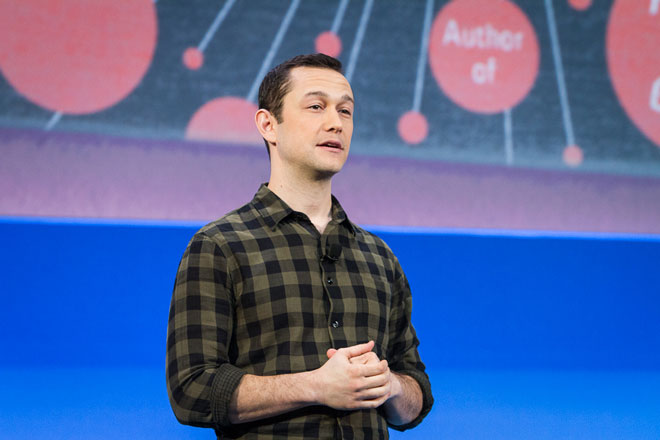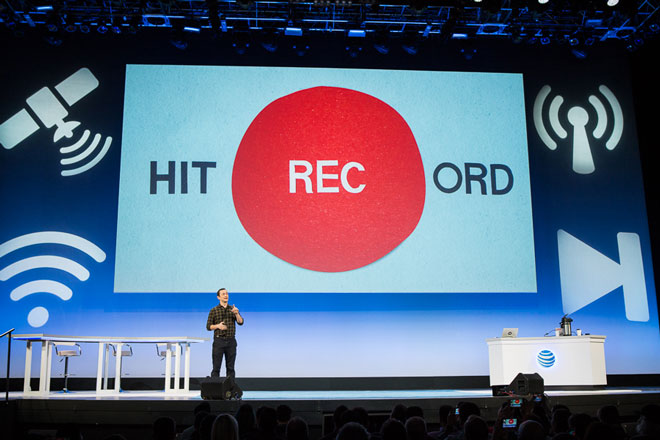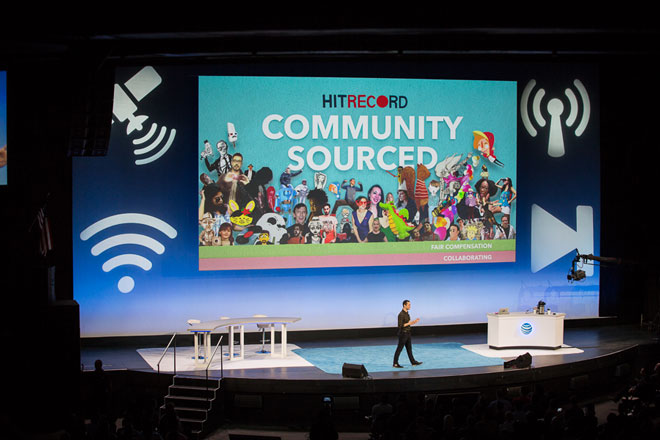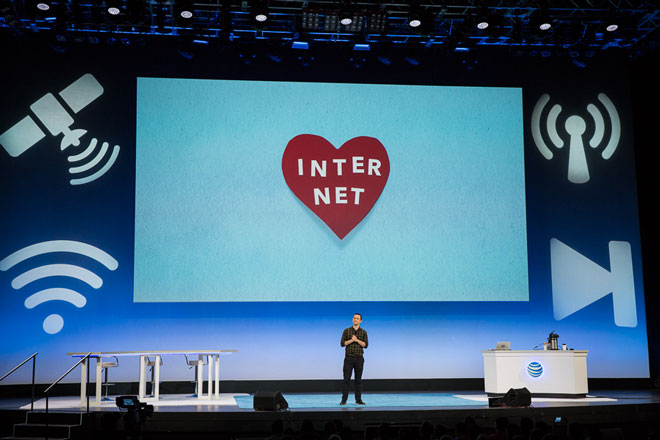Joseph Gordon-Levitt’s 3 pillars on how online culture could foster creativity
Online culture is a daily part of our existence and for better or worse it’s playing a large role in shaping our society and how we do things. Joseph Gordon-Levitt, founder of HITRECORD, has seen the site transform from a message board into a community-sourced production company. Along his journey, he’s come up with a few principles that demonstrate how when we engage with our online communities we can make amazing things together and shared those thoughts with AT&T Developer Summit attendees.

Gordon-Levitt started acting as a kid and he did pretty well. After a brief stint in college, he returned to his first profession and found he needed to steer his own career. He also had a catch phrase: Hit Record, which meant get started or make something. That’s exactly what he and his brother did when they created a company appropriately named HITRECORD.
What started as a website where Gordon-Levitt could share the short films he made, turned into an online community that collectively creates some of the most interesting entertainment you’ll find online. Much like developers attending Hackathons, HITRECORD became an online place where talented people from all over the world could work together to make something unique; to make something they probably couldn’t have done as well if they did it alone.

Over the past ten years, as HITRECORD has grown from a PHP message board to a collaborative community-sourced production company that has earned an Emmy (interactive media) for HITRECORD on TV, Gordon-Levitt has learned what it takes for an online community to be creative together and flourish. A big part of understanding the opportunities online culture can foster is looking at some of the current limitations: the crowd, free culture, and socializing. Let’s break these down:
The Crowd: Big data is a huge part of the Internet, where a computer can do something useful with the information it gathers about what people do online. While that information can be valuable to companies, the big data is not making anything creative. Similarly, while open contests can draw a crowd where people submit entries for a chance to win, this concept doesn’t necessarily take advantage of the idea of people working together to make something great. Instead, the act of competing for a prize has people working against each other.
Free Culture: We can learn just about anything online by typing in a basic search query. Information on history, music, journalism, art is all freely available to view with just a click of a mouse button. However, what’s the real cost and who is paying for it? All that information was created by someone who is not getting compensated for their work, instead the companies serving the ads or hosting the content are reaping the benefits. It’s diminishing the desire for creative people to follow their passions and create something new.
Socializing: We love to share our lives online and scroll through what others share on social media sites. While we scroll through a feed of images, we aren’t focusing on any one thing. This is limiting in its ability to facilitate creativity.
3 Pillars That Counter Current Online Culture
Gordon-Levitt takes those three concepts and turns them into alternative pillars that could use the online experience and tools to generate creativity. Those pillars are community, fair compensation, and collaborating.

Community: The biggest difference between a crowd and a community is that every member of a community is a unique individual. A community focuses on the quality of what members can bring, while a crowd is all about the quantity of people in a group.
Fair Compensation: If you do the work, you should get some money for it.
Collaborating: When people connect online and work toward a common goal, they can make extraordinary things together.
HITRECORD uses these concepts every day when they work on a project. Community members post a creative challenge or respond to one and the process begins. Productions are in a constant stage of remixing. You take something someone else made and add to it. These smaller contributions create a much bigger project that the individuals couldn’t have done on their own. If you work on a project that makes money, then you get paid. According to Gordon-Levitt, HITRECORD has paid over $2 million to contributors worldwide over the past six years. To get an idea of what can come out of a process where a community whose members receive fair compensation for collaborating on a creative project, watch the HITRECORD short film, First Stars I See Tonight.
Short films like that and much, much more is the kind of creativity the Internet has the power to facilitate. Gordon-Levitt’s three principles aren’t just limited to entertainment, they can be used in other industries, as well. The Internet is still very much in its infancy; we can’t even begin to imagine what it will be like a few decades from now. The point to remember is that we can make anything we want, but we can probably make it a lot better if we work together. And the Internet can help.

